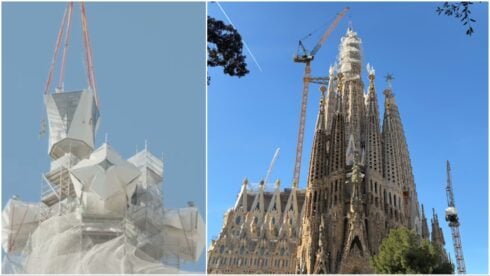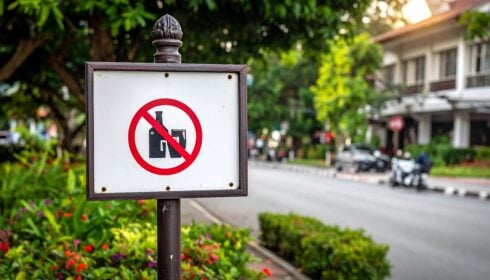SOME 6,500 people came out in Barcelona to protest on Thursday morning in support of independence for Catalunya. The demonstration coincided with a French-Spanish summit, at which Prime Minister Pedro Sánchez and President Emmanuel Macron held a bilateral meeting.
The slogan from the attendees was ‘Nothing is over here’, which is a direct response to Sánchez’s recent claim that the proces, as the pro-independence drive is known, was effectively finished after his government made a series of concessions to Catalan parties.
But the growing divisions between the pro-independence political groups in the region were once again on display on Thursday, and the president of the governing Catalan Republican Left (ERC), Oriol Junqueras, left the protest after an hour to the sound of jeers, whistling and even cries of ‘traitor’ from members of the crowd.
The demonstration was organised by a number of groups including the pro-independence Catalan National Assembly (ANC), and counted on the support of the ERC as well as the hardline Together for Catalunya (Junts per Catalunya) and the smaller Popular Unity Candidacy (CUP) party.
Junqueras is one of the group of politicians and civic leaders who were tried and jailed for their role in the 2017 independence drive in the northeastern region, which saw not only an illegal referendum on secession from Spain, but also a unilateral declaration of independence passed in the regional government.
However, the ERC has recently opted to take a different strategy than Junts and the CUP, one based on dialogue with the central government in Madrid rather than any further push for a unilateral breakaway.
This is why Junqueras, who was released from prison early after being given a government pardon, was received with such hostility at Thursday morning’s demonstration.
What’s more, the regional premier of Catalunya, Pere Aragones of the ERC, played the role of host at the French-Spanish summit today. This also raised the ire of the hardline pro-independence groups.
Speaking on Wednesday, Aragones defended the role of his party colleague. ‘Until Catalunya is independent, I will represent it with the maximum institutional dignity,’ he said in comments reported by Spanish daily El Pais. ‘We must take advantage of all of the opportunities, occasions and places to defend democracy and the citizens’ right to vote,’ he added.
The protest attracted 30,000 people according to the organisers, although the local police cited the aforementioned lower figure of 6,500.
The chosen site for the demonstration was at the bottom of the Montjuic mountain, by the Catalan National Art Museum (MNAC), the site of the French-Spanish summit.
The demonstration concluded with whistles and jeers when Sanchez and Macron arrived at the doors of the MNAC for their meeting.
The pro-independence movement has been in crisis for some 18 months now, something that led to the end of the coalition in the regional parliament between the ERC and Junts back in October.
Since then, the ERC has been governing alone, without a working majority, and must seek support from other parties such as the Catalan Socialists in order to pass legislation.
Since he came to power, Spanish Prime Minister Pedro Sánchez has opted for dialogue with Catalan politicians in a bid to defuse the volatile situation in the region.
As well as pardoning the jailed pro-independence leaders, his government has also made changes to the Criminal Code that have a direct effect on those who have already been tried, and those who are yet to be tried for their role in the events of 2017.
This includes the scrapping of Spain’s sedition law, and a change to the law covering misappropriation of funds, separating offences that are for personal gain or otherwise. This affects the pro-independence leaders as they used public money to pay for the referendum, among other items.
Read more:
- Sedition charges dropped by Spain’s Supreme Court against ex-Catalunya president Carles Puigdemont
- After making concessions to Catalan politicians, Spain’s prime minister rules out more talks
- Spain passes controversial changes to sedition and misuse of funds laws in midst of constitutional crisis
Click here to read more Catalunya News from The Olive Press.








